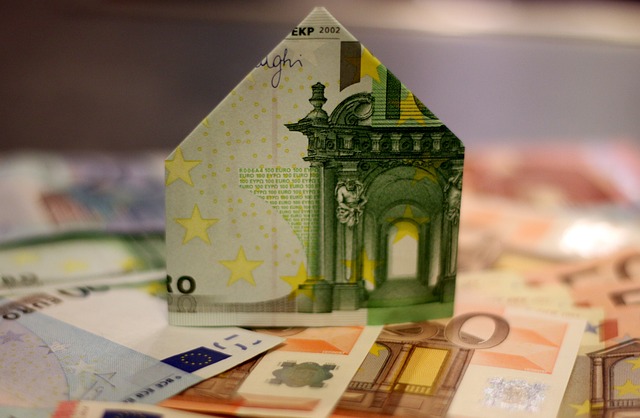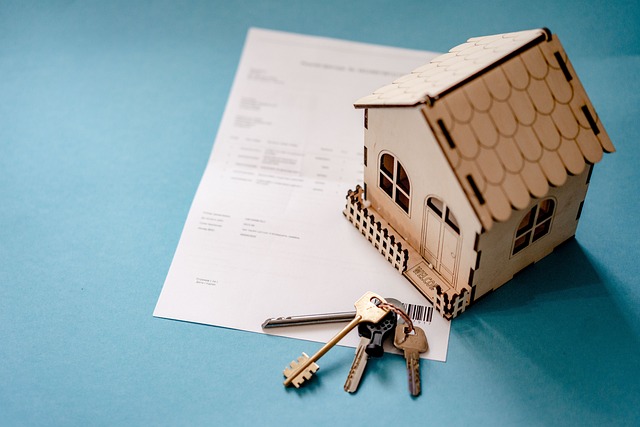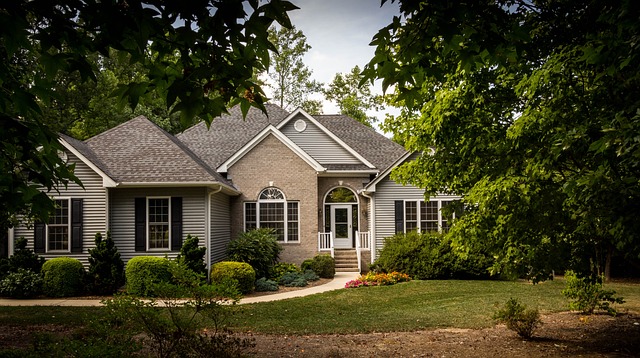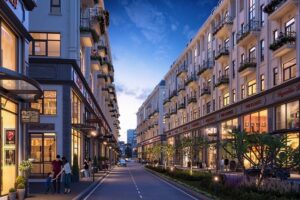Navigating Executive Condominiums (ECs) in Singapore: Pricing, Policies, and Market Trends
Executive Condominiums (ECs) in Singapore serve as a transitional housing option between public and private living for middle-income families. The average price of ECs has been on the rise, influenced by their location, development age, amenities, and governme…….

Executive Condominiums (ECs) in Singapore serve as a transitional housing option between public and private living for middle-income families. The average price of ECs has been on the rise, influenced by their location, development age, amenities, and government policies such as the Additional Buyer's Stamp Duty (ABSD), with factors like market demand and economic conditions also playing a significant role. ECs are known for offering larger living spaces and community facilities at more affordable prices compared to private condominiums. The average price of ECs in Singapore reflects these dynamics, with recent trends showing fluctuations due to new project launches, policy adjustments, and the impact of events like the COVID-19 pandemic. Prospective buyers should consider the evolving market conditions, including the resale market, when evaluating EC prices. The government's initiatives like SEB upgrading and the CPF Housing Grant further enhance the appeal of ECs, making them a sound investment with sustained growth potential. The average price of ECs in Singapore is expected to remain influenced by these factors, making it crucial for interested parties to stay informed about market movements and policy changes.
Executive Condominiums (ECs) in Singapore present a unique blend of public and private housing, catering to a diverse range of homeowners. This article delves into the nuances of ECs, from their evolution and policy impacts to price trends and amenities. With a focus on the average price of ECs in Singapore and future market dynamics, readers will gain valuable insights into this distinct segment of real estate. Join us as we explore the intricacies of living in an EC and what it means for your property investment portfolio.
- Understanding Executive Condominiums (ECs) in Singapore: A Comprehensive Guide
- The Evolution of EC Policies and Their Impact on the Property Market
- Average Price Trends for Executive Condominiums Over the Years
- Key Factors Influencing the Pricing of ECs in Singapore
- Exploring the Amenities and Benefits of Living in an EC
- Future Projections for EC Prices and Market Dynamics in Singapore
Understanding Executive Condominiums (ECs) in Singapore: A Comprehensive Guide

Executive Condominiums (ECs) in Singapore offer a unique housing option for couples and families looking for a step up from public housing but unable to afford private property. These hybrid properties start off with certain restrictions, such as ownership limits and the requirement that at least one unit in the EC must be owner-occupied, but they come with perks like larger living spaces and amenities comparable to those found in private condominiums. As of recent years, the average price of an EC in Singapore has been on an upward trend, reflecting their growing popularity and the desirability of living in a well-designed, high-quality development.
Prices for ECs can vary significantly depending on factors such as location, age of the development, and the availability of facilities. They are typically more affordable than private condominiums, making them an attractive option for middle-income families. The pricing landscape of ECs has been dynamic, with prices influenced by the supply of units, government policies like the Additional Buyer’s Stamp Duty (ABSD) for second-time property buyers, and overall economic conditions. Prospective buyers interested in the average price of an EC in Singapore should consider these factors, as well as the resale market trends, to make informed decisions about their investment. It’s advisable to monitor the property market closely, as prices can shift in response to changes in demand and policy adjustments.
The Evolution of EC Policies and Their Impact on the Property Market

The evolution of Executive Condominium (EC) policies in Singapore has been a significant factor influencing the property market dynamics. Initially conceived as a hybrid housing option for couples who cannot afford a public flat but earn too much to qualify for one, ECs have undergone substantial policy revisions over the years. These changes have been guided by the government’s commitment to ensure a stable and sustainable property market, catering to the diverse needs of Singaporeans at different life stages. The transition of ECs from Housing & Development Board (HDB) resale flat status to private property status after a certain period has been a key policy that has shaped the average price of ECs in Singapore. This transition, along with the adjustments in eligibility criteria, financing schemes, and the maximum income ceiling for applicants, have all contributed to the pricing and demand patterns within the market. The introduction of measures such as the Minimum Occupation Period (MOP) and the enhancement of the CPF Housing Grant (CHG) have further influenced the average price trajectory, making ECs a more attractive and attainable housing option for middle-income families. As a result, the average price of ECs has seen fluctuations reflecting these policy shifts, market demand, and economic conditions, thereby playing a pivotal role in shaping the broader property landscape in Singapore.
Average Price Trends for Executive Condominiums Over the Years

The average price trends for Executive Condominiums (ECs) in Singapore have shown a dynamic trajectory over the years, reflecting the evolving property landscape within the country. ECs are unique in Singapore’s real estate market as they cater to both upgraders from public housing and first-time homeowners who aspire to live in condominium living but at subsidized rates. The average price of an EC has fluctuated in response to various factors, including economic conditions, government policies, and market demand. For instance, in the early 2010s, EC prices saw a steady increase, driven by strong demand and limited supply. This trend was punctuated by cooling measures introduced by the Singapore government, which aimed to prevent speculative buying and ensure a stable and sustainable property market.
From 2013 to 2018, the average price of an EC in Singapore experienced growth, with prices peaking during this period due to robust sales and limited new project launches. However, since 2019, the average price has been on a downward trend as new projects were introduced and the overall economic climate shifted. The COVID-19 pandemic further influenced market conditions, leading to a softening of prices in many EC segments. Despite these fluctuations, the long-term outlook for ECs remains positive, with ongoing demand from middle-income families seeking larger living spaces closer to city amenities. Prospective buyers and investors keen on understanding the average price of an EC should consider the broader economic indicators and government policies that influence property prices in Singapore.
Key Factors Influencing the Pricing of ECs in Singapore

The average price of Executive Condominium (EC) units in Singapore is influenced by a multitude of factors, which collectively shape the real estate market for this unique housing type. These factors include the location of the EC, the age of the development, the size and layout of the units, as well as the maturity of the project. Prime locations such as those near the city centre or close to established towns with amenities like shopping centres, schools, and transportation nodes typically command higher prices. Additionally, the stage of construction can impact pricing; newer developments are often priced higher due to their contemporary features and potential for appreciation. Size and layout also play a significant role, as larger units with more desirable configurations tend to fetch higher prices. Furthermore, the supply of ECs and demand dynamics within the market influence pricing trends. Government policies, such as the eligibility criteria for purchasing an EC, can also affect demand and, consequently, pricing. Proximity to completed or upcoming MRT stations, as well as the presence of existing and planned infrastructure, are additional factors that buyers consider when evaluating the potential investment and livability of an EC. All these elements contribute to the current average price of ECs in Singapore, which reflects a complex interplay of market conditions, development characteristics, and investor sentiment.
Exploring the Amenities and Benefits of Living in an EC

Singapore’s Executive Condominiums (ECs) offer a unique blend of public and private housing benefits, catering to the aspirations of both families and investors. These ECs are designed with a host of amenities that ensure a comfortable living experience, often including swimming pools, gyms, playgrounds, and BBQ pits. Residents enjoy the convenience of facilities such as supermarkets, eateries, and shopping malls within walking distance, enhancing the lifestyle of those who opt for an EC over traditional HDB flats or private condominiums.
The Average Price Of Ec In Singapore has seen a steady increase over the years, reflecting their popularity and the high demand for these homes. As of recent data, prices have been influenced by factors such as location, age of the development, and the number of bedrooms. Prospective residents will find that ECs provide an affordable alternative to private condominiums while offering similar amenities and a strategic location close to transportation nodes like MRT stations and major expressways. This makes them an attractive option for individuals and families looking for a balance between affordability, convenience, and quality of life.
Future Projections for EC Prices and Market Dynamics in Singapore

The future projections for Executive Condominium (EC) prices in Singapore are influenced by a variety of factors including market demand, population growth, and government policies. As Singapore continues to develop, the demand for housing that offers both the benefits of a condominium and the flexibility to upgrade to private property is expected to remain robust. This dual appeal has historically supported stable price growth for ECs. Analysts predict that the average price of ECs in Singapore will likely continue to rise, albeit at a moderated pace, given the current economic climate and cooling measures imposed by the government to prevent speculative buying. These projections are based on the ongoing demand for quality living spaces close to key amenities and public transport nodes, which are characteristic of EC developments.
Market dynamics in Singapore’s EC segment are shaped by several key factors. The mix of housing types within EC projects caters to various demographics, from young couples to multi-generational families. Additionally, the location and infrastructure around new EC launches play a significant role in their desirability. The government’s strategic planning in terms of urban development and housing policies also influence market dynamics. For instance, the introduction of the Selective En Bloc Upgrading (SEB) scheme for ECs has been a game-changer, promising eventual upgrade to HDB flats within the same estate. This forward-looking approach ensures that the EC market in Singapore is poised for continued growth and remains an attractive investment opportunity for both residents and foreign investors alike, with the average price of ECs in Singapore reflecting these market conditions.
Executive Condominiums (ECs) in Singapore offer a unique housing option that bridges the gap between public and private housing, catering to the aspirations of middle-income families. This article has shed light on the various facets of ECs, from their evolution and market impact to pricing trends and the amenities they provide. As illustrated, the average price of an EC in Singapore has shown resilience and growth over the years, reflecting its status as a sound investment and a coveted lifestyle choice. Prospective buyers and investors alike can benefit from understanding the factors that influence EC prices and the dynamic nature of the market. Looking ahead, the continued popularity and strategic development of ECs signal a robust future for this segment of Singapore’s property landscape. With careful consideration and the right guidance, purchasing an EC remains an attractive proposition for those seeking a balance of affordability, space, and community living.







